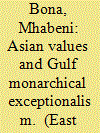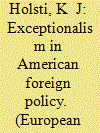| Srl | Item |
| 1 |
ID:
145138


|
|
|
|
|
| Summary/Abstract |
Political elites in both the Arab Gulf and Asia have, in recent history, cultivated narratives that seek to legitimize their respective alternatives to the Western liberal-democratic model of government. In the Gulf Arab countries, this has involved highlighting the benevolence of the state through national myths of monarchical exceptionalism, while ruling elites on the Eastern side of the continent have employed the Asian values hypothesis to great effect. In both regions, exceptionalist discourses have boosted elite legitimacy in the aftermath of the Cold War – often by co-opting subaltern themes from postcolonial discourses. This study posits that the similarities between the two regional discourses are significant and that the potential is high for a future ideological convergence between them. Through its analysis of the Asia-Middle East Dialogue (AMED) – a 2004 Singaporean initiative to foster greater interregional dialogue between Eastern and Western Asia – it identifies three discursive frames that mark the existing discourse between elites on the Eastern and Western ends of the Asian continent. Focusing on the implications that these three frames would have if further adopted in Gulf Arab elite discourse, it suggests that the opportunity for discursive synergies is high as the Gulf Arab states continue to “Asianize” in the coming years.
|
|
|
|
|
|
|
|
|
|
|
|
|
|
|
|
| 2 |
ID:
107605


|
|
|
|
|
| Publication |
2011.
|
| Summary/Abstract |
This article argues that exceptionalism is a type of foreign policy not exclusive to the United States. It examines other historical cases, including post-Revolutionary France and the Soviet Union. The three cases are comparable in terms of their main characteristics, which include claims of exemptions from the ordinary rules of international relations, messianic missions to 'liberate' others, and perceptions of universalized threats. The article also explores the historical and normative foundations of exceptionalist foreign policy claims and practices. All three cases demonstrate the assumptions of social and political superiority that underlie these normative bases. The article concludes with some observations about the incompatibility of exceptionalist foreign policies with the Westphalian foundations of the international order.
|
|
|
|
|
|
|
|
|
|
|
|
|
|
|
|